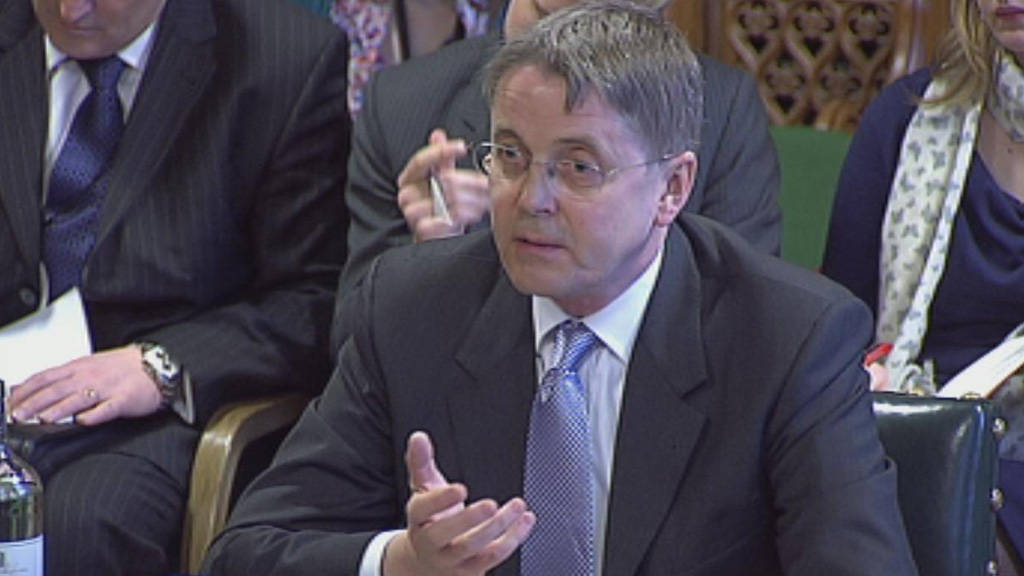Plebgate: Heywood criticised by MPs
Cabinet Secretary Sir Jeremy Heywood is sharply criticised by MPs for his botched investigation into former chief whip Andrew Mitchell’s “plebgate” row with Downing Street police officers.
The House of Commons public administration committee said Sir Jeremy was not the “appropriate figure” to carry out such an inquiry and suggested that his role as an “impartial investigator” was compromised.
Mr Mitchell was forced to resign following claims that he swore repeatedly at the officers and called them “plebs” after they refused to allow him to cycle through the Downing Street main gates.
However, evidence has since emerged casting doubt on the police account of events – which Mr Mitchell has always strongly disputed, insisting he did not use the word “pleb” and only swore once under his breath.
An email supposedly sent by a member of the public who witnessed the encounter backing the police version was found to have come from a serving police officer who was not even there, following an investigation by Channel 4’s Dispatches programme.
CCTV footage from the scene also appeared to undermine police claims that the row was overheard by bystanders outside the Downing St gates who were shocked at Mr Mitchell’s behaviour.
‘No conclusion on truth’
Scotland Yard has now mounted an investigation into what happened.
When he carried out his inquiry, Sir Jeremy failed to reach a conclusion on who was telling the truth, putting the discrepancies between the two versions down to a “genuine difference of view”.
However, the committee listed a number of errors in his inquiry.

It was “surprising”, the committee said, that Sir Jeremy had not been aware of a note of a conversation that the No 10 head of security and the Prime Minister’s principal private secretary had with the officer concerned shortly after the incident.
It was “equally surprising”, it said, that he did not seek to establish whether a reported leak of the police log of the incident in The Daily Telegraph was actually true.
Cameron ‘should have been told’
Given the doubts raised by the CCTV footage and the refusal of the author of the email to co-operate with his inquiry, the committee suggested Sir Jeremy should have advised David Cameron to refer the matter to the relevant police authorities so they could resolve any “discrepancies and inconsistencies”.
Instead, Sir Jeremy took the view that it was not his “job” to report the inaccuracies and unanswered questions to the police.
Overall, the committee said it was “regrettable” that the matter was not dealt with by the prime minister’s adviser on ministerial interests Sir Alex Allan – a former chairman of the Joint Intelligence Committee – who was the right person to handle such inquiries.
“Regardless of what the prime minister had or had not asked him to do, on establishing that there were unanswered questions about the incident, Sir Jeremy should have advised the prime minister that these questions required further investigation and therefore a wider inquiry,” the committee said.
“The events leading to the resignation of the government chief whip again demonstrate that the cabinet secretary is not the appropriate person to investigate allegations of ministerial misconduct.
‘Conflict with primary role’
“His role is limited; there is already intense pressure on his time and attention; and his role as impartial investigator may conflict with his primary role, which is to support the daily work of the prime minister and the government as a whole.”
The committee chairman, Bernard Jenkin, said: “This underlines the all-too-obvious truth that investigations into ministerial misconduct are not an appropriate role for the cabinet secretary to undertake.
“Given time, attention and with his relevant experience, Sir Alex might well have uncovered the truth.”
A Cabinet Office spokesperson said: “The PM continues to take a strong view that his request to the cabinet secretary to look into the emails and see whether they changed his initial judgment was the right request at the time. There is nothing in the report which alters this view.
“The cabinet secretary’s advice was very clear the emails were unreliable and should not be taken into account. The PM concluded Andrew Mitchell should stay in post. The cabinet secretary’s review did not in any way lead to Andrew Mitchell’s departure.
“It would also have been entirely inappropriate for the cabinet secretary to conduct a freelance private investigation into the veracity of the police.”